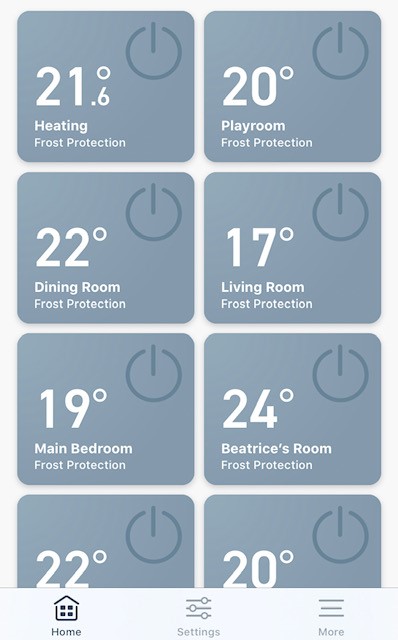On a very warm Friday afternoon, a short thread on my experience with @tado this winter and what it might mean for the decarbonisation of the UK& #39;s homes (1/n)
For those of you who don& #39;t know, Tado is a system that allows you to control the temperature of your home room-by-room. You have to change your radiator valves, which is pretty easy, and then everything is connected to your app (see picture)
You can just turn it up or down manually (whether you are at home or not) or set a schedule. It also has a geofencing function, which means it will turn your heating on automatically when your are on your way home.
In short, it has been amazing. Massively improved our heating experience: No more reaching behind the sofa to try and turn the TRV when the lounge has overheated; can get the kids& #39; bedrooms warmed up early;
... no more heating up spare room because you forget to switch off TRV when your mum stayed 6 months ago; and knowing when the top of the house is overheating. If you can, I would heartily recommend getting one (I am getting quite boring on this with my friends).
My wife, who could not give a stuff about energy policy, said she would now never live in a house without this level of control.
So what does this mean for domestic heat policy, perhaps the hardest nut to crack on the way to Net Zero?
First, the question people always ask is & #39;did it save any money& #39;? A rough calculation using smart meter data saw us using 6% less gas in Q1 vs last year (although that is not weather adjusted). But that is not the key point....
We certainly did not waste any energy by warming up rooms we were not using. But we may actually have used more in some circumstances, because it gave us a better experience.
The point was we had much, much greater control (apparently increasing one& #39;s control is important to lots of people... should tell the politicos). Combined with the half-hourly granularity of data that @OVOEnergy provides, I had a much better handle on what I was using/spending.
One point about this newfound control, was I had absolutely no idea I valued it until I had tried it. If you had said this would be important to me a year ago, I would have shrugged my shoulders (full disclosure, I got this system free, but I would definitely pay for it now)
Many people& #39;s heating experiences are actually not that great: drafts, too hot, too cold, thermostat wars, no idea how much they are spending. The kinds of new digital technology we are seeing enter the market can be an important part of improving that experience....
... identifying the bits of my house where the rooms are so badly insulated, you really struggle to get them warm when it is really cold; working out if my boiler is condensing properly etc etc....
The point being if you want 26 million homes to shift to low carbon systems at the pace you need to to meet Net Zero, you have a much better chance if they are moving to something that is BETTER (the lesson from pretty much every energy or tech transition in history).
I am still using a boiler, but if someone guaranteed the same quality of experience and took care of installing heat pump/retrofit measures etc, I would be willing to pay a bit more. At the moment, there are very few of those people (see blog) https://medium.com/@guynewey/five-steps-to-net-zero-levels-of-innovation-fa12ee0a3bbf">https://medium.com/@guynewey...
This is where heat as a service, where you buy an outcome, not just pay for the units of energy, is such a promising model. Give me a better experience, I don& #39;t care about the source of heating. We have done extensive work on it in our Living Lab.... https://es.catapult.org.uk/reports/ssh2-introduction-to-heat-as-a-service/">https://es.catapult.org.uk/reports/s...
We @EnergySysCat have also helped innovators develop service propositions now being used in the market https://es.catapult.org.uk/news/baxi-and-bristol-energy-heat-services/.">https://es.catapult.org.uk/news/baxi... This serviced approach is so common in other sectors -- whoever cracks it in energy could be in a brilliant commercial position....
And, you never know, it may help improve the politics of energy -- something that people like and want rather than simply grudgingly pay, who knows? Combined with EV serviced offering, then it may even be exciting....
We need to find an easier way to integrate and test all these smart, digital technologies and make sure they are all interoperable (so we do not have a repeat of SMETS1) and can help provide system flexibility. We are working on that.... https://es.catapult.org.uk/brochures/an-introduction-to-interoperability-in-the-energy-sector/">https://es.catapult.org.uk/brochures...
Right now my @tado system and my @OVOEnergy account are not integrated. Much richer and more valuable data and offerings could be developed if they were.....
And yes, we also need to fix markets and incentives across the energy system. Here are some thoughts on the challenge of decarbonising buildings: https://es.catapult.org.uk/reports/policy-framework-to-decarbonise-buildings/">https://es.catapult.org.uk/reports/p...
And, yes, before you say it, you also need to think carefully about vulnerability and what impact this might have. But there is no reason why such improved control and better ability to manage usage/cost should not benefit the fuel poor and other vulnerable consumers first.
See our Fair Futures work for more information on the work we are doing in this area or contact @drrosechard https://es.catapult.org.uk/impact/specialisms/fair-futures/">https://es.catapult.org.uk/impact/sp...

 Read on Twitter
Read on Twitter


